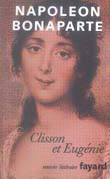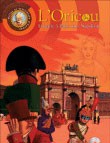Looking for that perfect 'Napoleonic' present. Here's our selection.
Happy Christmas!
MILITARY
BELL David A., The First Total War: Napoleon's Europe and the Birth of Warfare as We Know It, Houghton Mifflin, 2007
World War I has been called “the war to end all wars”, the first time combatants were mobilized on a massive scale to ruthlessly destroy an enemy. But as David Bell argues in this […] interpretive history, the Great War was not, in fact, the first total war. For this, we need to travel back to the era of muskets and sailing ships, to the age of Napoleon.
BOERI Giancarlo, ILARI Virgilio, CROCIANI Pietro, (eds) Storia Militare del Regno Murattiano, 1806-1815, Widerholt, 2007
A complete and detailled military history of the Kingdom of Naples under the “French” Kings (Joseph Bonaparte and Joachin Murat). 2,000 pages, 400 detailed files, 6,000 biographies, 400 images. In Italian.
BUTTERY David, Wellington Against Massena: The Third Invasion of Portugal 1810-1811, Pen & Sword, 2007
Wellington's clash with Massena was one of the most remarkable contests between two commanders in the Peninsular War. These two formidable generals carried on a campaign of manoeuvre, battle and attrition across Spain and Portugal in 1810 and 1811 which had a decisive impact on the outcome of the war. Wellington's reputation was enhanced, Massena's was ruined. David Buttery's […] analysis of this […] encounter offers […] insight into the personalities of these two […] soldiers. Using a variety of sources, in particular eyewitness accounts from both sides, he reassesses the […] confrontations at Ciudad Rodrigo, Almeida, Busaco, the lines of Torres Vedras and the final […] battle at Fuentes de Onoro. He sheds new light on this pivotal episode in the Napoleonic Wars and his account corrects the one-sided view of the campaign that has survived to the present day. In particular he reconsiders the true cost of the scorched earth policy that was employed against the French.
GRIFFITH Paddy, DENNIS Peter, French Napoleonic Infantry Tactics 1792–1815, (Elite 159), Osprey, 2007
Bonaparte's Grande Armée, one of the most renowned battle-winning machines in history, evolved from a merging of the professional army of the Ancien Régime and the volunteers and conscripts of the Revolutionary levée en masse – although the contribution of the former is often underestimated. A leading authority on the history of tactics draws here on original drill manuals and later writings to explain how the French infantry of 1792–1815 were organized for fire and movement on the battlefield. Illustrated by Peter Dennis with clear diagrams and relevant paintings and prints, and specially prepared colour plates, this text considers the tactical aspects of eight battles.
LEGGIERE Michael V., The Fall of Napoleon, vol. 1, The allied invasion of France, 1813-1814, CUP, 2007
This book tells the story of the invasion of France at the twilight of Napoleon's empire. With over a million men under arms throughout central Europe, Coalition forces poured over the Rhine River to invade France between late November 1813 and early January 1814. Three principle army groups drove across the great German landmark, smashing the exhausted French forces that attempted to defend the eastern frontier. In less than a month, French forces ingloriously retreated from the Rhine to the Marne; Allied forces were within one week of reaching Paris. This book provides the first […] English-language study of the invasion of France along a front that extended from Holland to Switzerland.
MIKABERIDZE Alexander, The Battle of Borodino: Napoleon Against Kutuzov, Pen and Sword, 2007
On 7 September 1812 at Borodino, 75 miles west of Moscow, the armies of the Russian and French empires clashed in one of the climactic battles of the Napoleonic Wars. This horrific – and controversial – contest has fascinated historians ever since. The survival of the Russian army after Borodino was a key factor in Napoleon's eventual defeat and the utter destruction of the French army of 1812. In this […] new study, Napoleonic historian Alexander Mikaberidze reconsiders the 1812 campaign and retells the terrible story of the Borodino battle as it was seen from the Russian point of view. His […] investigation of this critical episode in Napoleon's invasion of Russia provides the reader with a fresh perspective on the battle and a broader understanding of the underlying reasons for the eventual Russian triumph.
OLIVER Michael, PARTRIDGE Richard, The Battle of Albuera – 1811: 'Glorious field of grief', Pen and Sword Books, 2007
On 16 May 1811 a combined British, Portuguese and Spanish force commanded by the British general Beresford met the French army under Soult at Albuera in southern Spain. What followed was one of the bloodiest and most controversial battles of the Peninsular War. Yet despite the battle's significance in the wider campaign to expel Napoleon's armies from Spain, the story of Albuera has rarely received the coverage accorded to other battles of the war. In this […] book, Michael Oliver and Richard Partridge seek to set the historical record straight. They examine the carnage of Albuera in […] detail, and they give a[n …] account of the circumstances and the conflicting allied and French strategies that gave rise to this awful confrontation. […]
UFFINDELL Andrew, Waterloo Commanders: Napoleon, Wellington and Blucher, Pen & Sword, 2007
The three commanders-in-chief during the Waterloo campaign rank among the most famous soldiers in history. This book gives accounts of their parallel lives and extraordinary careers. It offers the contrasts that emerge between their backgrounds, personalities and methods of command.
COFFEE TABLE BOOKS
 LLOYD Clive, A History of Napoleonic and American Prisoners of War 1756-1816; Hulk, Depot and Parole and The Arts and Crafts of Napoleonic and American Prisoners of War 1756 – 1816, Antique Collectors' Club, 2007
LLOYD Clive, A History of Napoleonic and American Prisoners of War 1756-1816; Hulk, Depot and Parole and The Arts and Crafts of Napoleonic and American Prisoners of War 1756 – 1816, Antique Collectors' Club, 2007
Thousands of books have been published about war while the role of the prisoner of war has been largely ignored. A History of Napoleonic and American Prisoners of War 1756-1816; Hulk, Depot and Parole and The Arts and Crafts of Napoleonic and American Prisoners of War 1756-1816 are the outcome of the author's thirty year quest to collect information about a neglected and almost forgotten field of history, set against an historical background dating from the Seven Years' War (1756-63) to Napoleon's downfall in 1816. They document the arts, crafts and occupations of the prisoner of war in England, France and America from 1756 to 1816, providing the historical background to and detailed examination of a neglected area of warfare. They also illustrate the incredible skills possessed by the makers of these remarkable ‘works of art'.
ELTING Colonel John R., KNOTEL Herbert, Napoleonic uniforms, vols 1 and 2, Casemate/Greenhill, 2007
This is the presentation re-edition of colonel John Elting's remarkable compendium of Napoleonic uniforms. It is the only reference work of its kind to depict accurately the entire Grande Armée in detail. It […] portrays the various types of soldiers within the various regiments of the Grande Armée – officers, sergeants, color-bearers, bandsmen, drummers and trumpeters, privates and surgeons. In addition the volumes contain material on lesser-known formations such as the Army of Egypt (1798 – 1801), the pre-Revolutionary French Army, and Napoleon's police and internal security organizations. It includes nine hundred and eighteen original watercolors by Herbert Knötel, an […] acclaimed authority on military uniforms […]. Together with the late Colonel John R. Elting's definitive captions, they preserve a significant aspect of this famous era for historians, researchers, teachers, students, model makers, “uniformologists”, and the general reader interested in this historical period. Includes an index not present in the earlier edition.
BIOGRAPHIES
CANNON John, George III, OUP, 2007
From William Shakespeare to Winston Churchill, the Very Interesting People series provides authoritative bite-sized biographies of Britain's most fascinating historical figures. Each book in the series is based upon the biographical entry from the Oxford Dictionary of National Biography.
DUBERLY Frances Isabella, KELLY Christine, Mrs Duberly's War: Journal and Letters from the Crimea, 1854-6, OUP, 2007
Mrs Duberly's journal is one of the most vivid eye-witness accounts we have of the Crimean War. Fanny Duberly, then aged 25, accompanied her husband to the Crimea in 1854, and remained there until the end of the fighting, the only officer's wife to remain throughout the entire campaign. She survived the severe winter of 1854-55, witnessed the battle of Balaklava and the charge of the Light Brigade, and rode through the ruins of Sebastopol.
HAYTHORNTHWAITE Philip J., Wellington: The Iron Duke, Potomac BOoks, 2007
One of the Duke of Wellington's officers once remarked, “We would rather see his long nose in the sight than a reinforcement of ten thousand men.” Arthur Wellesley, first duke of Wellington (1769–1852), was one of the greatest military commanders in history and is best known as the successful opponent at Waterloo of arguably the leading general of all time, Napoleon Bonaparte.
HILLIARD ATTERIDGE A., Napoleon's brothers, Nonsuch Publishing, 2007
A treatment of the lives of Napoleon's brothers, Joseph, Lucian, Louis and Jerome, first published in 1909.
WILLIAMS Kate, England's mistress: The infamous life of Emma Hamilton, Arrow Books Ltd (Random House), 2007
A […] tale of sex, glamour, intrigue, romance and heartbreak, England's Mistress traces the rise […] of […] Emma Hamilton. Born into poverty, she clawed her way up through London's underworlds of sex for sale to become England's first media superstar. Nothing could stand in her way of her desire to live out her dream – except her self-destructive desires. England's Mistress draws on many previously undiscovered letters.
NOVELS
 NAPOLEON I, Clisson et Eugénie (ed. Emilie Barthet and Peter Hicks, with Gerard Gengembre), Fayard, 2007
NAPOLEON I, Clisson et Eugénie (ed. Emilie Barthet and Peter Hicks, with Gerard Gengembre), Fayard, 2007
When gunner Bonaparte was bored in garrison he began writing a novel recounting a tragic tale of love and loss, modelled on the author's affair with Désirée Clary. But this text was not mere autobiography. It was also a bold mixture of the popular literary genres of the period, pastoral, reverie and epistolary romance…Whilst he never finished it (the ‘whiff of grapeshot' and Josephine got in the way), it is a striking outburst of Romanticism from the man whose name was to become synonymous with pragmatism. Fayard has published a new edition of the work, including ten never before seen pages discovered by the editors. (Text in French)
CABASSON Armand, The Officer's Prey, Gallic Books, 2007
June 1812. Napoleon begins his invasion of Russia leading the largest army Europe has ever seen. But amongst the troops of the Grande Armee is a savage murderer whose bloodlust is not satisfied by battle. When an innocent woman is brutally stabbed Captain Quentin Margont of the 84th regiment is put in charge of a secret investigation to unmask the perpetrator. Armed with only the sole fact that the killer is an officer, Margont knows that he faces a near impossible task and the greatest challenge of his military career.
HISTORY
 LENTZ Thierry, Nouvelle histoire du Premier Empire (volume 3: La France et l'Europe de Napoléon 1804-1814), Fayard, 2007
LENTZ Thierry, Nouvelle histoire du Premier Empire (volume 3: La France et l'Europe de Napoléon 1804-1814), Fayard, 2007
When it comes to Napoleon, we have a remarkable and extraordinary privilege: and this is that it's always possible, despite the huge number of books written about him, to take say something new about the man, the sovereign, his work and his reign. Thierry Lentz has given striking proof of this. The first two volumes of his Nouvelle Histoire du Premier Empire were based on an analysis of the system of power as one in perpetual motion, from conquest to collapse, within the space of a single decade. The third volume in this sequence takes a «transversal» approach, to use the author's word, more descriptive, more static – although that is perhaps a word which does not quite fit such a ‘devourer of time'.
NAPOLEON I, Correspondance générale de Napoléon Bonaparte : volume 4, Ruptures et fondations (Breaking with the past and laying the foundations of the future), 1803-1804. Fayard, 2007
This fourth volume of the Correspondance générale, published by the Fondation Napoléon with Edition Fayard, contains 2,077 letters and a preface by Thierry Lentz. It was edited by François Houdecek in collaboration with Gabriel Madec, and it covers the years 1803 – 1804. The title of the volume ‘Ruptures et fondations' (Breaking with the past and laying the foundations of the future) sums of the content. There is the breakdown of the Peace of Amiens and the foundation and organisation of the Boulogne invasion camps, but there is also the ‘monarchisation' of the Republic and the establishment of the Empire, ending with the coronation of Napoleon as first ‘Emperor of the French'.
HOOCK Holger, (ed.) History, Commemoration, and National Preoccupation: Trafalgar 1805-2005, OUP, 2007
This volume explores the commemoration of the Battle of Trafalgar and Admiral Lord Nelson's death over the past two centuries. It includes the extraordinary celebrations of 2005, which saw hundreds of official, commercial, and popular events celebrating and commemorating the bicentenary of Trafalgar and the death of Nelson.
PATI Biswamoy, (ed.) The 1857 Rebellion, OUP India, 2007
On the occasion of the 150th anniversary of the memorable 1857 Rebellion, this book situates the way the nature of the Rebellion has been debated over the last century and a half. This is achieved by tracing the historiography of the Rebellion and incorporating vital selections – including tracts from some out-of-print books – to bring to the reader a comprehensive picture of the Rebellion. The volume also brings together the expanding boundaries of research, some historians have traced its interactions with the adivasis, explored gender-related issues and brought out fascinating aspects related to the mentalities of the Rebellion.
BLANNING T.C.W., Pursuit of Glory: Europe 1648-1815, Allen Lane, 2007
In “The Pursuit of Glory”, Tim Blanning brings to life one of the most extraordinary and dynamic periods in Europe's history: from the desolate, battered and introvert continent of the end of the Thirty Years War to the overwhelmingly dynamic one that experienced the French Revolution and the wars of Napoleon. How did people really live their lives? How did they understand their world? What did they buy? What did they eat? How did they pray? What were their loyalties and their values? From the lives of ordinary farmers and soldiers to great kings, princes and bishops and the dominant personalities of the age (Louis XIV, Frederick the Great, Napoleon); from art, leisure pursuits and garden design to the strange sport of fox-tossing, Blanning explores this era of immense change, and cultural, political and technological ferment. This was a world in which the elite were obsessed with the pursuit of glory: their own glory, that of their families and that of their countries. It was a time of immense expenditure – as much on clothes, banquets and palaces as on fortresses and artillery – which shaped the societies and economies of entire countries.
WHEELER H. F. B., BROADLEY A. M., Napoleon and the invasion of England: the story of the Great Terror, Nonsuch Publishing, 2007
First published in 1908, this is an in-depth study of the period 1797-1805, when the threat of a French invasion of England reached it height. It was a danger which dominated the thoughts and conversations of the English population to such an extent that the period was to become known as the 'Great Terror'.
WILSON Ben, Decency and Disorder: The Age of Cant, Faber and Faber, 2007
We all see the Victorians as a respectable, well-mannered and sober people, yet a generation before Queen Victoria ascended the throne, the British were notorious for their boisterous pastimes, plain-speaking and drunkenness. How was it that this free-spirited and pleasure-loving people embraced the kinds of values that we know as Victorian moralism? “Decency and Disorder” is about the generation who grew up during the turmoil of the Napoleonic Wars. Acclaimed young historian Ben Wilson recreates their age, and some of its most exciting figures, in this landmark history book.
MULTIMEDIA
 CD
CD
OFFENBACH Jacques, CD – Offenbach Romantique, Archiv, 2007
Before becoming the high priest of Operetta in Second Empire Paris, Offenbach was a virtuoso of the cello; indeed he was called ‘the cello Lizst'. In April 1847 he performed for the first time his magnificent cello concerto, but it was subsequently forgotten. In later years, different movements were unearthed but the work was never performed in it entirety. However, after many years of research, a complete version of the work has been recorded by Jérôme Pernoo with the orchestra the Musiciens du Louvre, under Marc Minkowski. The cd is currently available under the title Offenbach Romantique produced by Archiv Produktion.
CD ROM
The Vulture: Investigation in Paris under Napoleon, Nemopolis, 2007
An educational Cd ROM set in Paris during the Napoleonic period, by Nemopolis. The aim of the game is to use a specially prepared First Empire encyclopaedia to help you to solve some mysteries and to prevent the criminal Du Noï from committing further crimes.


